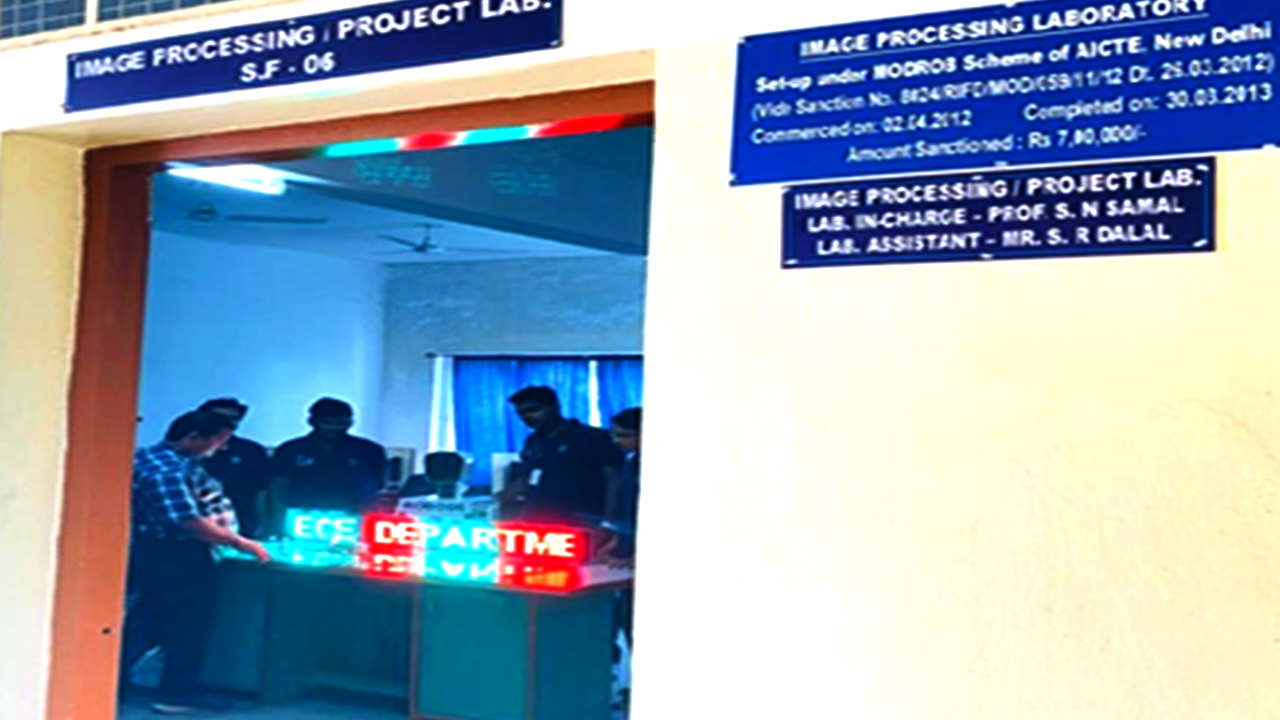Mechanical Engineering Labs
Driving Progress Through Engineering Excellence.
The Department of Mechanical Engineering is committed to embracing cutting-edge technology to enhance education and research, fostering a culture of innovation and excellence. Our dedicated faculty ensures the holistic development of students, preparing them to excel in diverse professional fields. With over 450 successful alumni, our graduates are employed in prestigious organizations such as Tata Consultancy Services, Infosys, Cognizant, Toyota, Triveni Turbines, Tech Mahindra, and Amazon. Many also pursue advanced degrees at top institutions like IITs and NITs. To keep students abreast of industry trends, the Department regularly hosts expert talks, seminars, workshops, and conferences. We offer specialized courses on topics like solar energy, robotics, and mechatronics to enhance employability. Our sophisticated laboratories, covering areas such as Fluid Mechanics, Material Testing, and Robotics, provide a robust foundation for both academic and research pursuits, equipping students with the skills needed to meet future challenges.

Staff
Mr.Sameer Sahoo
Hydraulic Machines Lab
Fluid Mechanics Lab, Material Testing Lab
Cnc Lab, R & AC Lab
Heat Transfer Lab, Machine Dynamics Lab
Ncsm (Autocad-Solid Modelling Lab)
E-mail:
Mr. Pratap Sahoo
Machine Shop
Automobile Lab
ED Hall
Work Shop
E-mail: anitasahoo@driems.ac.in
Mr. Sambit Kumar Behera
R & AC Lab
I.C.Engine Lab
Mechanical Measurement Lab
Project Hall
E-mail: devismita@driems.ac.in
Hydraulic Machine Lab
- Simulation Tools: ANSYS Fluent, OpenFOAM for computational fluid dynamics (CFD) simulations.
- Hydraulic Benches: Used for various experiments related to fluid flow and hydraulic machinery.
- Turbine Test Rigs: For studying the performance of different types of turbines (e.g., Pelton, Francis, Kaplan).
- Pump Test Rigs: For analyzing the performance of centrifugal and reciprocating pumps.
- Flow Measuring Devices: Venturi meters, orifice meters, and flow nozzles.
- Pressure Gauges and Manometers: For pressure measurement in fluid systems.


Fluid Mechanics Lab


- CFD Software: ANSYS, MATLAB for fluid flow analysis.
- Flow Visualization Apparatus: For observing laminar and turbulent flow patterns.
- Bernoulli’s Theorem Apparatus: To verify Bernoulli’s principle in fluid flow.
- Hydraulic Bench: Used for conducting various fluid mechanics experiments.
- Viscometers: For measuring the viscosity of liquids.
- Flowmeters: Devices such as rotameters and Pitot tubes for measuring fluid flow rates.
Automobile Lab
- Automotive Simulation Tools: GT-SUITE, AVL Cruise, Simulink for vehicle dynamics and powertrain simulations.
- Engine Test Rigs: For analyzing the performance of different types of engines.
- Chassis Dynamometer: For testing the power output and performance of vehicle engines.
- Emission Testing Equipment: For measuring and analyzing exhaust emissions.
- Transmission Systems: Models for studying the working principles of manual and automatic transmissions.
- OBD Scanners: For vehicle diagnostics and fault detection.


CNC Lab (Computer Numerical Control)


- CNC Programming Tools: Mastercam, SolidCAM, AutoCAD for generating G-code and simulating machining operations.
- CNC Simulators: Software or virtual CNC machines for practice without using actual machines.
- Tooling Systems: Cutting tools and tool holders for CNC machines.
- Measuring Instruments: Calipers, micrometers, and coordinate measuring machines (CMM) for precision measurement.
- Safety Equipment: Protective gear, including safety glasses and gloves.
Heat Transfer Lab
- Heat Transfer Simulation Tools: ANSYS, MATLAB for thermal analysis and simulation.
- Heat Exchangers: Different types for studying heat transfer efficiency.
- Convection Apparatus: For studying natural and forced convection heat transfer.
- Thermal Conductivity Apparatus: To measure the thermal conductivity of various materials.
- Infrared Thermometers and Thermal Cameras: For non-contact temperature measurement and visualization.
- Cooling Towers: For experiments related to evaporative cooling processes.


Refrigeration and Air Conditioning (R&AC) Lab


- R&AC Simulation Tools: CoolPack, HVACSIM+ for simulating refrigeration cycles and HVAC systems.
- Vapor Compression Refrigeration Systems: For hands-on training and analysis.
- Air Conditioning Systems: Central and split air conditioning units for studying cooling and heating processes.
- Psychrometric Charts: For analyzing air properties and processes.
- Pressure and Temperature Gauges: For monitoring system parameters during experiments.
Machine Dynamics Lab
- Dynamic Simulation Tools: MATLAB, Simulink for modeling and analyzing machine dynamics.
- Vibration Testing Apparatus: For studying the free and forced vibrations of mechanical systems.
- Gyroscopes and Balancing Machines: For understanding rotational dynamics and balancing of rotating components.
- Cam and Follower Mechanisms: To study the motion and dynamics of cam-operated systems.
- Governor Apparatus For experiments on speed regulation in engines and machinery.


Internal Combustion (I.C.) Engine Lab


- Engine Simulation Tools GT-Power, AVL Boost for engine performance and combustion modeling.
- Single-Cylinder and Multi-Cylinder Engines For studying different aspects of engine performance.
- Dynamometers: For measuring engine power output and efficiency.
- Emission Analyzers: For analyzing exhaust gases and studying combustion efficiency.
- Fuel Consumption Meters: For measuring and analyzing fuel consumption during engine operation.
- Cooling and Lubrication Systems: For studying the effects of temperature and friction on engine performance.
Mechanical Measurement Lab
- Data Acquisition Tools: LabVIEW for data acquisition and analysis in measurement experiments.
- Precision Measuring Instruments: Vernier calipers, micrometers, height gauges, and dial indicators.
- Strain Gauges and Load Cells: For measuring mechanical stresses and forces.
- Pressure and Temperature Sensors: For monitoring and recording mechanical measurements.
- Surface Roughness Testers: To assess surface finish and quality.
- Coordinate Measuring Machines (CMM): For precise measurement of complex geometries.


Engineering Drawing (ED) Lab


- CAD Tools: AutoCAD, SolidWorks for creating engineering drawings and 3D models.
- Drawing Instruments: Setsquares, compasses, scales, and protractors for manual drafting.
- Model Kits: For visualization and understanding of mechanical components.
- Plotters and Printers: For producing detailed engineering drawings and schematics.
- 3D Printers: For creating physical prototypes from CAD models.
For creating physical prototypes from CAD models.
- NC Programming Software: Mastercam, SolidCAM for CNC programming and simulation.
- Virtual CNC Machines: For practicing CNC operations in a simulated environment.
- 3D Printers: For rapid prototyping and understanding the principles of numerical control.
- Cutting Tools and Materials: For real-time CNC operations and experiments.


Project Lab


- Project Management Tools: Microsoft Project, Primavera for project planning and management.
- Simulation and Design Software: Depending on the project, tools like MATLAB, SolidWorks, ANSYS, or Simulink may be used.
- Prototyping Tools: 3D printers, electronics kits, and machine tools for building and testing prototypes.
- Collaboration Tools: Whiteboards, projectors, and spaces for group discussions and presentations.
- Documentation Tools: Access to LaTeX, Microsoft Office for preparing project reports and documentation.
Material Testing Lab
- Material Analysis Software: Minitab, OriginPro for analyzing material test data and generating reports.
- Universal Testing Machine (UTM):For conducting tensile, compression, and bending tests on materials.
- Hardness Testing Machines: Rockwell, Brinell, and Vickers hardness testers.
- Impact Testing Machines: For assessing the toughness of materials under sudden impact loads.
- Sieve Shakers: For particle size analysis of granular materials.
- Ovens and Furnaces: For heat treatment and testing thermal properties of materials.


Workshop


- Workshop Management Tools: Software for scheduling, inventory management, and safety protocols.
- Machine Tools: Lathes, milling machines, drill presses, grinders, and welding equipment.
- Hand Tools: Wrenches, hammers, screwdrivers, and saws for basic mechanical work.
- Safety Equipment: Goggles, gloves


